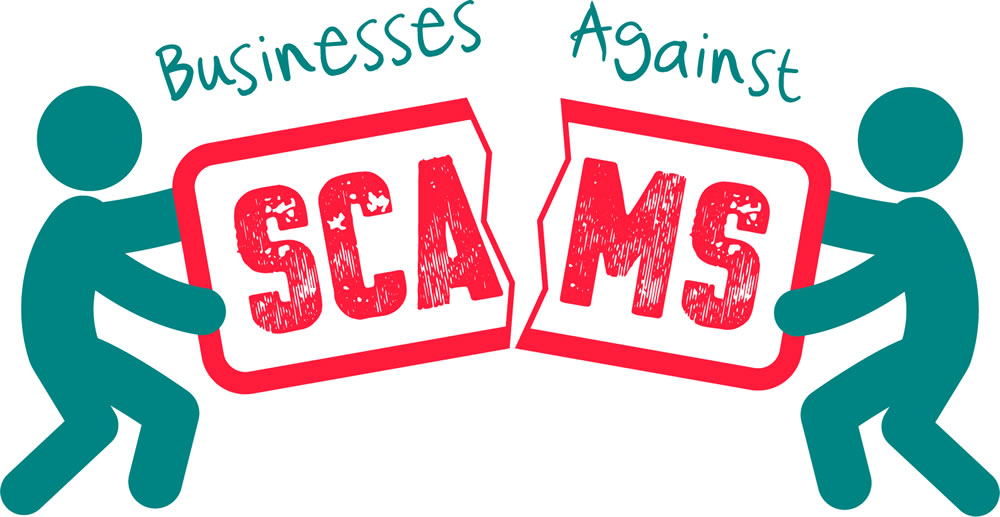Pull the plug on heartless criminals targeting companies, traders and householders.
That's the call from East Dunbartonshire Council, which is backing a new initiative to combat fraud against businesses as firms and employees work from home during the pandemic.
Businesses Against Scams is a cross-industry campaign, led by National Trading Standards, which provides free tools for companies to upskill and train workers to help identify and prevent illegal activity.
Potential security risks include criminals targeting employees working from home who are isolated from colleagues - impersonating Government officials or a senior member of the business to put pressure on them to give out sensitive information or make payments.
Using equipment necessary for remote working - such as Wi-Fi hubs - can also present cyber security challenges.
Louise Baxter, Head of the National Trading Standards Scams Team, said, "We've launched Businesses Against Scams as a free tool for organisations to help safeguard their business, and protect their workforce and customers.
"The free training is empowering businesses and employees – who are all adapting to new working environments – to take a stand against scams by equipping them with advice and knowledge."
Visit www.friendsagainstscams.org.uk/BAS for information and to access resources.
Meanwhile, fraudsters and thieves continue to prey on householders - particularly the most vulnerable.
The Council's Trading Standards team is here to help residents and firms get the information and support they need to pull the plug - and slam the door - on criminals.
A dedicated webpage is being regularly updated to provide information on scams being perpetrated during the pandemic
You can also visit www.eastdunbarton.gov.uk/residents/trading-standards
If you think you have been scammed or need advice - whether you're a business or individual - call Trading Standards on 0300 1234510 or e-mail trading.standards@eastdunbarton.gov.uk
You can also call Police Scotland on 101 (999 if you feel threatened or in danger).
Councillor Andrew Polson, Joint Leader of the Council, said, "I welcome the new Businesses Against Scams initiative, which will help local firms and traders to guard against criminal activity - protecting the economy and jobs in the process. These thieves will stoop to any depths in a bid to steal and defraud, but working together we can pull the plug on them."
Councillor Vaughan Moody, Joint Leader of the Council, added, "We are doing all we can with partners such as Police Scotland to stop these crooks in their tracks - whether it is online or on the doorstep. It's particularly despicable that these criminals are seeking to exploit the COVID-19 pandemic. If you have vulnerable neighbours or relatives, please keep an eye out and ensure they are aware of how to get help."
* For more information on business support available during the coronavirus crisis, visit the Council's dedicated webpage - www.eastdunbarton.gov.uk/covid-19-business-support
You can also visit www.businessworks.scot, e-mail Covid19BusinessSupport@eastdunbarton.gov.uk or call 0141 578 8530. More than £10.6 million worth of support grants have already been processed by the Council and Business Gateway East Dunbartonshire (as of 26 May 2020).
* The Businesses Against Scams initiative provides free online training modules, including examples of prominent scams and how to avoid falling victim.
Allison Simon, Head of Fraud, Commercial Banking, NatWest Group, said, "During this uncertain period, fraudsters are using the anxiety and stress caused by the crisis to try and target individuals and businesses with seemingly legitimate and convincing requests.
"We’d encourage all businesses to remember three basic tips to keep themselves safe. Firstly, never rely on just an e-mail to validate payment – contact the sender on a trusted number. Second, NatWest will never telephone you asking you to transfer money to a new or safe account. And finally, if you receive a request from a supplier to update bank account details, always call back using a trusted contact number to check it’s genuine."
The most common scams targeting businesses include:
- Government grant/tax refund scams – A business is contacted by phone, e-mail or post by Government imposters suggesting that the firm might qualify for a special COVID-19 grant or a tax refund. Variations on the scheme involve text messages, social media posts and phone messages. Businesses should be cautious about unexpected urgent communications offering financial assistance. Check the information is genuine by using official Government websites. You can also visit the Council's dedicated business support webpage - www.eastdunbarton.gov.uk/covid-19-business-support
- Invoice/mandate scams – A business may receive unsolicited contact from someone claiming to be from a regular supplier. They claim their bank account details have changed and ask you to alter their payment details. Never rush a payment. Use contact details that you already hold or that have been obtained independently rather than any included in the request. Do not call the number in the request or reply with your e-mail details as this may be fraudulent.
- CEO scams - A sophisticated scam that plays on the authority of company directors and senior managers. An employee receives a phone call or e-mail from someone claiming to be a senior member of staff ... who then asks for an urgent payment to a new account and instils a sense of panic. Scammers may even hack a staff e-mail account or use spoofing software to appear genuine. Be cautious about unexpected, urgent requests for payment and always check the request directly if possible.
- Tech support scams – With more people working remotely and IT systems under pressure, criminals may impersonate well-known companies and offer to repair devices. Criminals are trying to gain computer access or get hold of passwords and login details. Once they have access, criminals can search the hard drive for valuable information. Always check that the bank or payment website you’re using is secure - a small padlock beside the web address will confirm you’re using a secure site. Always be suspicious of cold callers. Genuine companies would never call out of the blue and ask for financial information.
Follow us on Twitter @EDCouncil or like us on Facebook